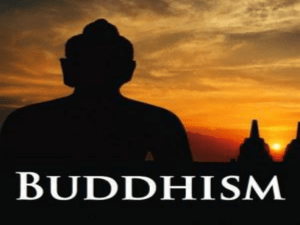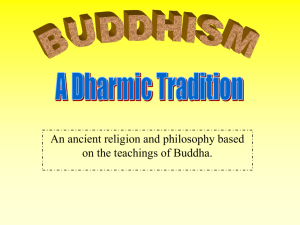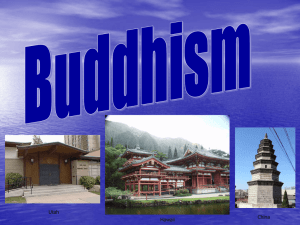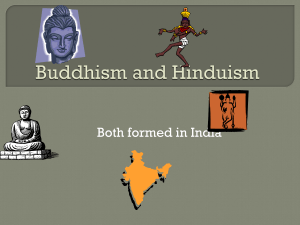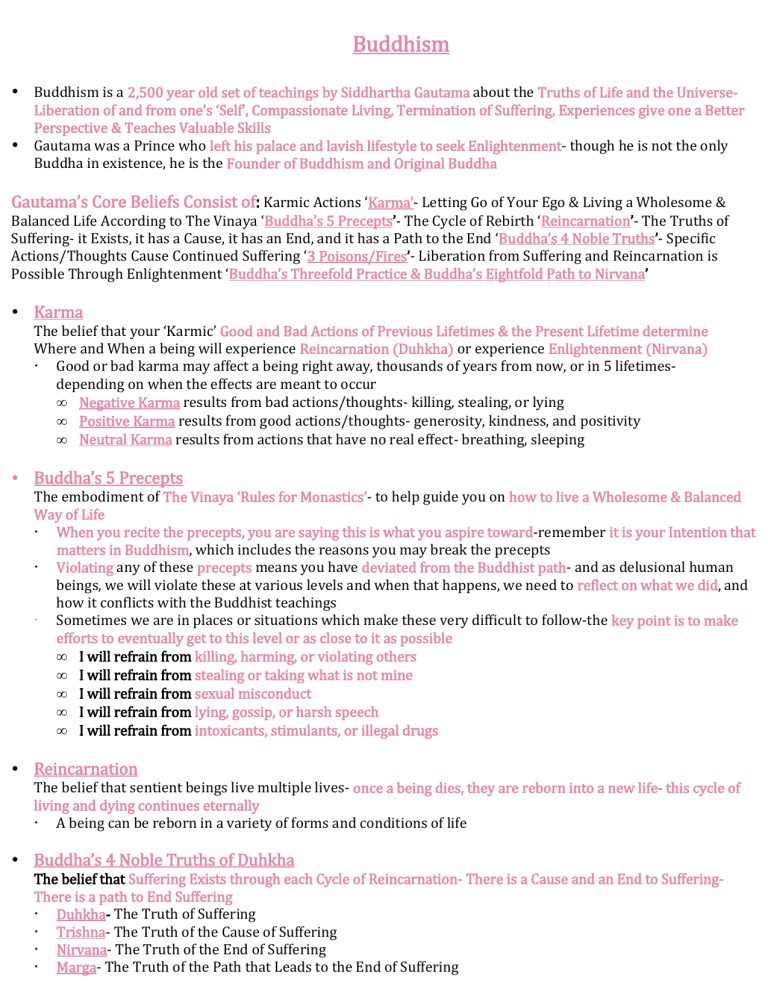
Buddhism Buddhism is a 2,500 year old set of teachings by Siddhartha Gautama about the Truths of Life and the Universe Liberation of and from one’s ‘Self’, Compassionate Living, Termination of Suffering, Experiences give one a Better Perspective & Teaches Valuable Skills Gautama was a Prince who left his palace and lavish lifestyle to seek Enlightenment- though he is not the only Buddha in existence, he is the Founder of Buddhism and Original Buddha Gautama’s Core Beliefs Consist of: Karmic Actions ‘Karma’- Letting Go of Your Ego & Living a Wholesome & Balanced Life According to The Vinaya ‘Buddha’s 5 Precepts’- The Cycle of Rebirth ‘Reincarnation’- The Truths of Suffering- it Exists, it has a Cause, it has an End, and it has a Path to the End ‘Buddha’s 4 Noble Truths’- Specific Actions/Thoughts Cause Continued Suffering ‘3 Poisons/Fires’- Liberation from Suffering and Reincarnation is Possible Through Enlightenment ‘Buddha’s Threefold Practice & Buddha’s Eightfold Path to Nirvana’ Karma The belief that your ‘Karmic’ Good and Bad Actions of Previous Lifetimes & the Present Lifetime determine Where and When a being will experience Reincarnation (Duhkha) or experience Enlightenment (Nirvana) Good or bad karma may affect a being right away, thousands of years from now, or in 5 lifetimesdepending on when the effects are meant to occur Negative Karma results from bad actions/thoughts- killing, stealing, or lying Positive Karma results from good actions/thoughts- generosity, kindness, and positivity Neutral Karma results from actions that have no real effect- breathing, sleeping Buddha’s 5 Precepts The embodiment of The Vinaya ‘Rules for Monastics’- to help guide you on how to live a Wholesome & Balanced Way of Life When you recite the precepts, you are saying this is what you aspire toward-remember it is your Intention that matters in Buddhism, which includes the reasons you may break the precepts Violating any of these precepts means you have deviated from the Buddhist path- and as delusional human beings, we will violate these at various levels and when that happens, we need to reflect on what we did, and how it conflicts with the Buddhist teachings Sometimes we are in places or situations which make these very difficult to follow-the key point is to make efforts to eventually get to this level or as close to it as possible I will refrain from killing, harming, or violating others I will refrain from stealing or taking what is not mine I will refrain from sexual misconduct I will refrain from lying, gossip, or harsh speech I will refrain from intoxicants, stimulants, or illegal drugs Reincarnation The belief that sentient beings live multiple lives- once a being dies, they are reborn into a new life- this cycle of living and dying continues eternally A being can be reborn in a variety of forms and conditions of life Buddha’s 4 Noble Truths of Duhkha The belief that Suffering Exists through each Cycle of Reincarnation- There is a Cause and an End to SufferingThere is a path to End Suffering Duhkha- The Truth of Suffering Trishna- The Truth of the Cause of Suffering Nirvana- The Truth of the End of Suffering Marga- The Truth of the Path that Leads to the End of Suffering Duhkha Exists, Duhkha has a Trishna- results of Craving, Clinging, Greed, Anger, & Ignorance, Duhkha has a Nirvana, Duhkha has a Marga to Nirvana ‘The Noble Eightfold Path’ 3 Poisons/Fires The Main Causes of our Continued Suffering that all Buddhists try to put an End to Greed- Self, Craving, Clinging Anger Ignorance- Delusion Buddha’s Threefold Practice The 3 groups of Buddha’s Noble Eightfold Path- its specifically designed to help us eliminate the 3 Poisons- once eliminated, we are Awakened, Enlightened, and Realize our True Nature- Nirvana Morality- The Precepts ‘Rules’- purpose is to prevent Unwholesome conduct and wrongdoing Meditative Concentration- The ability to face the 8 Winds of Gain, Loss, Defamation, Honor, Praise, Ridicule, Sorry, Joy- once proficient, you become unmoved by anger or joy and not encumbered by happiness or suffering Wisdom- The ability to identify right from wrong and truth from falsehood is through development of wisdom. This goes beyond just faith, as we must strive to break down the delusion that blinds us from the truth Buddha’s Noble Eightfold Path The Path to Nirvana Panna- Wisdom, Discernment Right View To have the right concepts and right ideas Observations that lead us away from delusion and wrong views It is Wisdom that truly comprehends Cause and Effect The right understanding that results from contemplating phenomena through the 3 Dharma Seals, 4 Noble Truths, & 12 Links of Dependent Origination Right Thought To have the right determination, right differentiation, right awareness, or right intention Eliminates the 3 Poisons- by keeping your thoughts in accord with the right Dharma at every moment Shila- Virtue, Morality Right Speech Wholesome verbal karma- refers to 4/10 Wholesome Actions. Words of Truth- words that are true, honest, and not duplicated Words of Compassion- words that are kind, soft, and give confidence Words of Praise- words that encourage and bring joy Words of Altruism- words that help and benefit others Right Action Wholesome bodily karma- refers to 3/10 Unwholesome Actions: not killing, not stealing, and not engaging in sexual misconduct- behavior that is right and in accord with the truth Following this is just passively not committing unwholesome deeds. The active meaning of right action is to protect life, be compassionate, and give to charity Right Livelihood The right occupation and right way to make a living Having a moral profession in life is extremely important because most unwholesomeness comes from doing things that harm others and ourselves Samadhi- Meditation, Concentration Right Effort To have the right diligence, right skillful means, and caring for the Dharma it means that we should move in the direction of truth with courage and diligence To prevent unwholesome states that have not arisen To end unwholesome states that have arisen To develop wholesome states that have not arisen To strengthen wholesome states that have arisen Right Mindfulness To have true contemplation- to have a mind that is pure, aware, and does not give rise to unwholesome thoughts- contemplating the right path Contemplate the Impurities of the Body Contemplate the Suffering of Feelings Contemplate the Impermanence of the Mind Contemplate the Non-Selfhood of Phenomena Right Concentration To have the Right Meditative Concentration- using Samadhi to focus the mind and settle the distracted body to better cultivate ourselves- true Samadhi is not merely a matter of sitting in meditation; it is also developing and exploring our inner capacity Cultivating the Right Meditative Concentration should bring us good health- help us focus on single mindedness and attain peace- clarify the mind and lead us from ignorance to the state of awakeningreveal our Buddha nature and allow us to discover our true self A primary goal of a Buddhists is to stop Reincarnation, become Enlightened & attain Nirvana- like Buddha difficult to achieve for most simply due to having too many attachments in life to make meaningful progress and built-up delusion we have Eventually one will have the opportunity to become Enlightened- We understand this thanks to Buddha’s prior lives where he consistently made progress and vows to achieve Enlightenment. And he did in his final life- and helped others achieve Nirvana Even if you don’t achieve Enlightenment in this life, Buddha’s teachings allow us to live our lives closer to how it should be lived- and in turn, we are helping to transform the suffering of others in the process Buddhists see Wisdom as a set of Stepping Stones Level 1- Listen, Study, Learn Level 2- Contemplate All the Knowledge You Gained Level 3- You Gain Enlightenment This means You need to Focus on Learning- Put what You Learn to Practice (Deep Study of Dharma, Philosophy, Psychology, Science, History, or any subject that gives insight into how the world functions) Primary goals of Buddhists are the notions of Anatman ‘to Let Go of Our Ego’ and Impermanence ‘Recognizing our minds are constantly changing & most things don’t really matter in the end Ego is ingrained deep in our psyche because it evolved as a way to survive- its our instincts and thought patterns that developed to help us navigate the complex world- it's primary goal is to keep us alive and reproducing However, many mechanisms that were meant to ensure our survival are also the root of our pains and the goals of our ego often clash The ego drives you to always want more, but this striving is also the cause of your suffering There is an entrenched belief in your own fixed identity, where the ego becomes intertwined with your sense of “I am”- this rigidity is the source of many of your mental miseries The way to get away from this type of thinking is to realize that your mind is in a state of constant fluxImpermanence Things are fluid- they change- you are not the same person you were a few years ago, and in the future, you won't remain the same person as now Buddhist Schools Both Theravada & Mahayana Buddhism have the same basic beliefs, but there are differences in the teachings they focus on Theravada Buddhism- Focuses on teaching the Dharma- the goal is to become a monastic in another life if you cannot become one now Mahayana Buddhism- Focuses heavily on becoming a being on their way to Enlightenment ‘Bodhisattva’ Nichiren Shoshu BuddhismZen BuddhismPure Land Buddhism- Why I feel the need to adopt a new Faith different than my Christianity Roots While other religions tell you what to think, in Buddhism you are meant to discover things by yourself Being able to incorporate Eastern Teachings into my own philosophy of life has allowed me to reframe my mindset- the principal take away for me has been a set of tools to overcome the most difficult challenges a person can face Buddhism sees existence as a series of pains- many of them are self-created- by keeping a few simple Buddhist concepts in mind, you acquire a set of guiding principles to help solve the various challenges a chaotic world throws at you You don't have control over what happens to you, but you can influence what you think about it First Verse of Dhammapada states, “All that You are is a Result of Your Thoughts” The teachings of Buddha show you a path to channeling these self-destructive tendencies You gain Discipline from Buddhism- a trait that can be applied in all aspects of your life Buddha reminds us that THIS Human Existence is a Rare and Wonderous thing Buddhism is about YOUR Effort and Practice Nobody else is going to do this for you An Opaya ‘Daily Practice’ is your constant faith, effort, and determination to continue the path towards Enlightenment All journeys begin with the first step on a path or road, and that first is up to you Need-To-Know-Lingo (Buddhist Version) Abhidharma- The analytical and commentary, helps cultivate wisdom Anatman- Letting go of your Ego Arhat- A being who has attained Nirvana Bodhisattva- A being who is on the way to Enlightenment Buddha- An awakened being who has achieved perfect Enlightenment- the ultimate goal of Buddhism Dharma- Teachings of Buddha (Religion/Faith) Karuna- Compassion, wanting to alleviate the suffering of others- the key to living a happy life- feeling concern for the suffering of others, no matter who they are by putting yourself in their shoes & trying to see the world through their eyes (Mostly people deny the suffering of others and instead focus on their own suffering)- help others when they fall down Mettla- Compassion and Loving-Kindness, proactively wanting to make someone happy- making others happy while they are still standing up Mudita- Enjoy the little thing and be happy for others- the feeling of Unrestrained Joy for other people- being happy purely for another person and appreciating their deeds and fortune with nothing to gain, moments that give you calmness and perspective (Dancing in the Rain) Nirvana- Spiritual bliss that transcends beyond duality, language, time, space, and perception- the result after attaining Enlightenment Prajna- Study of how the world works, and act according to that knowledge- the Right UnderstandingWisdom, the profound understanding of how the world really works Sangha- The Buddhist Community Shila- Don’t engage in actions because they are good for you- do them because they are the right thing to doEngaging in Just Action & living in an Ethical way- not lying, stealing, or doing things that profit others- respect everyone, do kind things, & live in a virtuous way Sutras- Sacred Buddhist Texts Upaya- Skillful Means, also considered as your Daily Buddhist Practice- includes several practices, ceremonies, etc Venerable- The title of an ordained monk or nun, seen wearing specific colored robes of their tradition and sect Vinaya- The discipline ‘Rules’ for Morality Duhkha- Suffering Opaya- My Daily Buddhist Practice Meditation Station Meditation Station & Alter should include: Meditation Cushion- Beanbag Buddha in Lotus Position Statue Pictures of loved ones and respected teachers, Cross Sit on Meditation Beanbag facing towards Alter/Wall Give Offerings- Incense, food/water, flowers Recite The Triple Gem A way of refilling our reservoir of faith in Buddhism and the Buddha’s teachings as you begin each day Buddha- Doctor Dharma (His Teachings)- Prescription to Cure us Sangha/Temple (His Monastic Community)- Nurses/Hospital *Bow after each: I take refuge in the Buddha, wishing that all sentient beings understand the Dharma and make the supreme vow I take refuge in the Dharma, wishing that all sentient beings study the Sutras diligently and obtain an ocean of wisdom I take refuge in the Sangha, wishing that all sentient beings lead the masses in harmony without obstruction The Vinaya- Recite The 5 Precepts When you recite the precepts, you are saying this is what you aspire toward-remember it is your intention that matters in Buddhism, which includes the reasons you may be breaking the precepts I will refrain from killing, harming, or violating others I will refrain from stealing or taking what is not mine I will refrain from sexual misconduct I will refrain from lying, gossip, or harsh speech I will refrain from intoxicants, stimulants, or illegal drugs Recite The 5 Remembrances These 5 Reflections show us our fears (they can seem dreary, scary, and unnerving), but also give us ways to face them head on- when we recite our fears, we are confronting them to accept and overcome them The first step onto the Eightfold Path Reflections 1-3 Include Buddha’s 4 Sights- it was these Sights that fundamentally shocked Buddha to his core and prompted him to seek the path towards Enlightenment Reflection 4 focuses on Buddhists entire practice of not just removing the false concept of self, but also truly understanding Impermanence and when understood, both are intertwined Reflection 5 is Empowering- it tells us that WE, not anything else, have full control over our actions while we cannot escape the consequences of our actions, we can ensure they are wholesome, not unwholesome I am subject to aging (I am going to grow old) There is no way to avoid aging (There is no way to escape growing old) I am subject to ill health (I am going to get sick) There is no way to avoid illness (There is no way to escape getting sick) I am subject to die (I am going to die) There is no way to avoid death (There is no way to escape death) Everyone and Everything I love is subject to die (Everyone and Everything that I love will die) There is no way to avoid being separated from them (There is no way to escape being separated from them) My only true possessions are my actions (My actions are the ground upon which I stand) I cannot avoid their consequences (I cannot escape their consequences) Read Sutra The Lotus SutraThe Heart SutraThe Diamond SutraThe Great Perfection of Wisdom SutraSigalovada Sutta- Buddha provides instructions for laypersons Anapanasati Sutta- Basics of Breath Meditation Maha-Satipatthana Sutta- Basics of Mindfulness Sabbasava Sutta- Overcoming External Influences that Pollute the Mind Ambalatthika-Rahulovada Sutta- Teaching on Virtue Samadhanga Sutta- Teaching on Concentration Dhatu-Vibhanga Sutta- Teaching on Wisdom Karaniya Metta Sutta- Practice of Loving-Kindness Meditation Sitting Meditation Sit with your back straight- neck aligned with spinal column Relax every muscle in your body Observe if there is any tension in the body As your body relaxes, the attention will automatically go to your breath Observe the nature of your breath; is it long or short; obstructed or not? Observe how you feel in your body as you breathe in As you keep doing this, your body begins to Relax Then you began to experience the comfortable feeling of Relaxation Then you begin to experience Satisfaction Focus your attention on the experience of Satisfaction and Comfort Observe any thoughts that arise in your mind and let them go Observe the mood of your mind Maintain attention on your breath and the tranquility that arises from it Remain in this state of Tranquil Observation of your body and mind as long as possible Chanting Meditation Walking Meditation Dedication of Merits A highly symbolic and meaningful practice where the benefits you gain are not retained by you, but instead given away- you are dedicating the wholesome merit you accumulated not just by doing this daily practice, but what you acquire through your constant actions, to other sentient beings Buddhism is centered around breaking down the false concept and belief in “self”- if you are doing all this for “you” to benefit, you are just reinforcing the “self” rather than breaking it down Dedicate to loved ones, deceased loved ones, Friends, someone treating you poorly Make kindness, compassion, joy, and equanimity pervade all worlds May we cherish and build affinities to benefit all beings May Chan, pure land, and precepts inspire equality and patience May our humility and gratitude give rise to great vows For all sentient beings, I dedicate the meritorious actions of this practice or action so they may be guided and liberated from delusion and suffering with the light of the Buddhas Dharma

